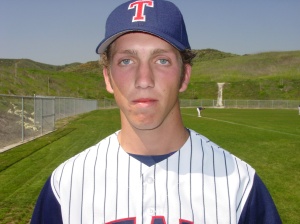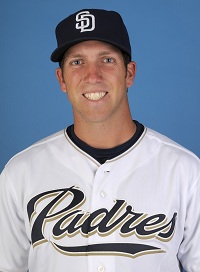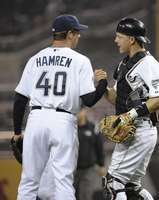 On my recent journey to the 2014 European Baseball Championship in Regensberg, Germany, I was fortunate to speak with 37-year-old MLB European academies consultant and 2014 Team France bench coach Andy Berglund. His energy and passion for the game was apparent on and off the field. Serving as France manager Eric Gagne’s right-hand man, Berglund proved to be worth his weight in gold as the French advanced with Italy and Germany to the second round of competition in Brno, Czech Republic.
On my recent journey to the 2014 European Baseball Championship in Regensberg, Germany, I was fortunate to speak with 37-year-old MLB European academies consultant and 2014 Team France bench coach Andy Berglund. His energy and passion for the game was apparent on and off the field. Serving as France manager Eric Gagne’s right-hand man, Berglund proved to be worth his weight in gold as the French advanced with Italy and Germany to the second round of competition in Brno, Czech Republic. 
Andy Berglund: I played outfield and pitched when I was in high school and in college I was a utility player in the leagues I played in. I had two shoulder surgeries during my college years that knocked me out of competition. When I was healthy again I played that utility role over in Europe and Australia. I did catch some games in Europe, so I’ve played every position.
Roberto: Did that help you later as a coach knowing the roles and responsibilities of each position?
Andy Berglund: Absolutely. I think once you’ve played the position, you at least have a feel for what a player goes through. There are some many intangibles (receiving, blocking, throwing, calling a game, being a vocal captain of the infield) to being a solid catcher, for example, that to teach it at a higher level, I think you have to also experience it as well.
Roberto: You actually began coaching youth baseball while still very young, right? What attracted you to this profession?
Andy Berglund: I started coaching youth baseball when I was still around 15, during summers in North Dakota. My father was a high school wrestling, football and baseball coach, so I took after him and saw how much enjoyment he got out of coaching. I started focusing more on coaching as a profession when I realized injuries were going to keep me from reaching the level I wanted to on the field. I didn’t want to be away from the game, and coaching was the next logical step.

Roberto: Did you consider playing professionally in America before embarking on your first European adventure playing in Sweden for the Alby Stars and coaching the Eliteserien team in 2002? How were you recruited?
Andy Berglund: To be honest, I was planning on going to law school out of college. After I graduated, an opportunity came about to go to Europe for the summer, and I discovered baseball was developing there. I worked for MLB International that first summer and through meeting other European players, I landed a spot in Sweden. Those first two summers got my foot in the door to the playing and coaching opportunities I’ve had over the last 13 years now in Europe.
Roberto: Knowing European baseball was in its infancy, did you have the patience to grow the game?
Andy Berglund: To me, the game is still in a grass roots phase here, just trying to be mentioned with soccer and hockey, which dominate the European landscape. Your patience is definitely tested at times, but that’s the beauty of the challenge. I’ve met dozens and dozens of people in the same situation in Europe baseball development, who have had their own part in growing this beautiful game on European soil.
Roberto: Was it difficult to play in adverse weather conditions in North Dakota and later in Scandinavia? Please describe the worst care scenario you ever played in.
Andy Berglund: The cold conditions you deal with are part of growing up in the north for sure. I’ve played in games where snow was coming down, actually coached in games in April in Prague where it was snowing and have been “snowed-out” in games up in Sweden. Coaching the Czechs in the World Baseball Classic Qualifier in 2012 was brisk. There were parkas everywhere in the stands.
Roberto: You played baseball internationally in England, and Western Australia as well, correct? Exactly where? How did that help your mission?
Andy Berglund: I played for the Melville Braves in Western Australia. They actually won the WA State League title this past year, so I’m very happy for the club. It was a long time coming. The experience in Australia was very helpful in me seeing how aggressive they played the game. The Aussie’s are just flat out tough characters on the field. I truly respected that about them. Part of the mission here in Europe is to make the players tougher and more game-tested, and the experience in Australia was a good reference point. I loved how they played. The game has developed a lot in Australia the past 10 years as well with the ABL coming back and more and more players in the U.S.
Roberto: When did you become a Major League Baseball International coach?
Andy Berglund: Working with the MLB Roadshow from 2001-2004 in the UK and Germany. I started as an MLB Envoy in 2009 in Germany and 2010-2011 in the Czech Republic.
Roberto: Your coaching stints for MLB included time in England, Sweden and three years in Germany, correct?
Andy Berglund: Yes, and that’s expanded into the role I have now, which is an MLB Academies Consultant. There are nearly 20 different Academies in 11 different European countries now that MLB supports with coaching, equipment and player development.
Roberto: As the Ambassador for MLB and its development in the UK and Germany, you introduced baseball to over 20,000 children for their first time. Describe that experience. How were you recruited for this position?
Andy Berglund: As part of the MLB Roadshow, we would spend weeks on the road and each week visit new schools in bigger German and UK cities to introduce the game of baseball. The goal of the program was to introduce the sport and get kids excited about playing and joining local clubs and participating in MLB’s Pitch, Hit & Run program as well. I was recruited through a friend named Ian Young and in turn met Jason Holowaty, who I now work directly with on game development in Europe and Africa.
Andy Berglund: The toughest part of working in Europe is being away from family and I try to get back as often as I can. My oldest brother has three young sons, and it’s challenging being away and missing the finer parts of watching them grow up. Still, we find ways to see each other every year and make the most of it.
Roberto: Considering you returned to Northern Europe as a player and coach for the Stockholm Baseball Club in 2008, you must have loved it there. In fact, you led the team to its first ever Swedish Championship. Did that validate your belief that you could instill success into the mindset of other players?
Andy Berglund: Sweden is a beautiful country. That season, I specifically wanted to come back over to coach, play and win a title with Bjorn and Peter Johannessen, who had became friends over the years. I was really welcomed there by the Claesson family, who oversee the club. The dedicated people in the club made it a goal to really put together an action plan to develop the youth programs and build the best club in Sweden. Stockholm has won 5 of the last 7 Swedish championships since then and have a solid youth program with new facilities being built.
Roberto: You later became a member of the Swedish Senior National Team in 2009. At that point, did you know coaching in Europe was your destiny?
Andy Berglund: Not fully, but I knew that there would always be an attraction to coaching baseball in Europe not matter where I was in the world.
Roberto: However, it appeared that the West Coast was tugging at your uniform as you spent time in Newport Beach, Laguna Beach, Dana Point and Carlsbad. What attracted you to Southern California?
Andy Berglund: I wanted to experience baseball year-round and found a great opportunity to coach at a high school in Newport Beach. It was my first real head coaching position, and I really enjoyed learning what it takes to try and build a championship program.
Roberto: You began as the head coach for Sage Hill High School in Newport Beach in 2008 after the baseball team had endured its third consecutive losing season. You turned things around there after developing a thorough communication program involving the student-athletes and their parents. You were selected as 2008 Academy League High School Coach of the Year. While at Sage, you put together a 51-18 overall record which included two league titles and one second place finish. During this time you were influenced by the likes of Mark McGwire, Wally Joyner, Bruce Hurst, and Lee Smith. You also studied the modern science of pitching with Tom House and Ron Wolforth. Care to comment on your experience coaching in Orange County and working with these former pros?
Andy Berglund: I had seen videos on Ron Wolforth’s Athletic Pitching program and read books on Tom House’s pitching philosophy as a way to learn more as a coach, on arm action and pitching. We were fortunate enough to have Tom House come visit Sage Hill for a practice and he worked brilliantly with our pitchers. I met Ron Wolforth this past year at a conference in Paris. I thanked him for showing me a new way to train and protect young pitchers arms. I met Mark McGwire while doing ProKids Academy camps with his sons back in Southern California and picked up some great hitting tips from him. Joyner, Hurst and Smith, I met later on at our European Elite Academy in Italy. They are all wonderful teachers. You’d have to pinch yourself sometimes, being such a fan of these guys growing up, and then having conversations with them. The past few years the Elite Camp has featured Barry Larkin, Steve Finley, Greg Swindell, Tom Gordon, John McLaren, Art Howe and Dale Murphy, to name a few. It’s an amazing experience to pick these guys’ brains on the game.
Roberto: You left it all behind to become the head coach for the Eagles Praha of the Czech Pro League. In addition, you served as head coach for the Czech Senior and Junior National Teams in 2011 and 2012–leading to the highest finishes in the country’s history (Silver Medal). Did that give you confidence that you could impact a developing nation’s appetite for the game?
Andy Berglund: My time on the field in the Czech Republic was very rewarding. We took the same approach with trying to build on what was already there and fine-tune it into something special. I think you said it correctly, because the appetite for baseball in the Czech is definitely growing and they are really having some success. It’s great to see their young teams go to the Little League World Series, the World Championships and have the success they are having. It proves a small baseball country can achieve big things.
Roberto: How did it feel being nominated as the EBCA Coach of the Year in 2011 and speaking at the Coaches Convention?
Andy Berglund: I was very fortunate to be considered and very happy for Brian Farley when he won. I thought the Dutch’s 2011 World Championship really helped put European baseball on the map in ways it had never been before. Now the Dutch and Italians are beating traditional baseball powerhouses in the World Baseball Classic and it is great for the exposure and development of the game overseas.
Roberto: Did you start up the Czech MLB Baseball Academy?
Andy Berglund: No, Martin Smidt started the Prague Academy and David Winkler started the Brno Baseball Academy. I help with their development on behalf of MLB. The Brno Academy has really developed into a solid program and a lot of those players are representing the Czech U15, U18 and U21 teams that are winning medals at the European Championships.
Roberto: Did you enjoy serving as the bench coach for Team France in the 2014 European Baseball Championship?
Andy Berglund: Yes. A lot of work was put into getting France back on the right track by the federation, so it was good to be a part of.
Roberto: You have been a strong advocate for baseball in both France and Czech Republic. Both teams made strong showing in the Euros and their numbers have jumped up considerably in the International Baseball Rankings. Do you think that your coaching has catapulted these countries into becoming up-and-coming powerhouses?
Andy Berglund: I would say the success in France and the Czech Republic has been result of the good people in the federation that are willing to push the envelope for development working well with the best coaches in the country. It takes getting into a room, getting to the bottom line, discussing the resources you have, putting together a blueprint and attacking the goal you all want to achieve. Throw away the politics. Get down to business. For me, wherever I have coached, my goal was never to finish anywhere but the top. Once the players embrace that vision, you truly have something powerful and dangerous anytime you step on the field.
Roberto: Do you believe MLB will embrace European baseball as they have in other parts of the world and invest there beyond the MLB academies?
Andy Berglund: I do. I know they are looking into having an opening MLB series being played in Europe, much like they did in Australia this past year. I know it is an intriguing market for MLB, especially with the success the NFL has had hosting games in London and the NHL has had hosting games in Europe.
Roberto: What is your personal opinion on the future of baseball in Europe?
Andy Berglund: It’s going to continue to grow. You are going to continue to see more players signed out of Europe and Africa. Hopefully soon, you’ll see more of them playing in the Big Leagues. The process is just going to take time. The level of play here has definitely increased; the domestic leagues have become stronger, as have the national teams. There are some more established countries here in Europe that have strong ambitions to take the game to another level, numbers wise, exposure wise and game development wise. They will be leading the charge to see where the game is over the next 5-10 years.
France placed sixth in the 2014 European Baseball Championship in Brno, Czech Republic.

Andy Berglund: Definitely. They bring even more exposure to the sport and raise the interest that much higher. You are talking about two huge names in baseball that only stopped playing in the MLB less than 10 years ago. To have them involved is huge for marketing the sport and also raising the interest back in the U.S. on how and why these guys are getting involved.
Roberto: Any final thoughts to share?
Andy Berglund: The last thing I’ll mention is something I’ve learned from Barry Larkin. His advice to the game is: “Get Better Every Day. Today, be better than you were yesterday. And tomorrow, be better than you were today.” I think that’s the best way to look at what we are all trying to accomplish in baseball, as players, coaches and in development, to keep you humble and to keep you motivated.












